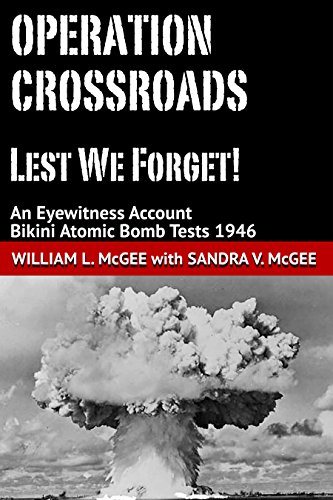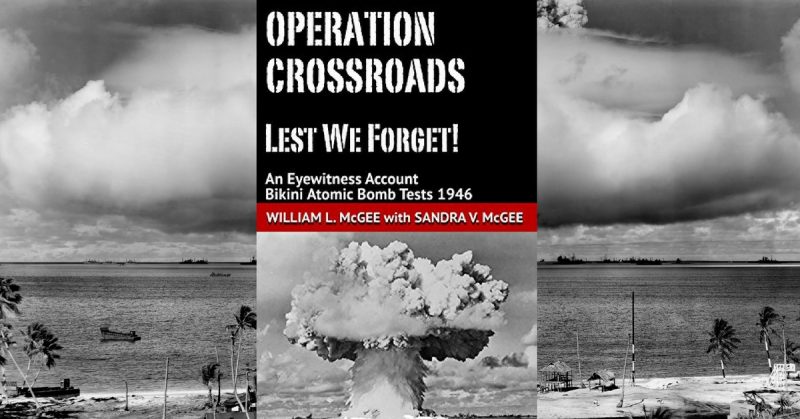This has been an incredibly busy year in which I have been attempting to wade through a phalanx of titles sent to me by the big guns of military history publishing. This is all well and good, but long term prisoners of my ramblings will know I have become a huge fan of the vast number of self or small output publisher books coming out of the United States and elsewhere. Happily, the quality and diversity of all this stuff has been consistently good, serving up rewarding reads of occasionally unusual subject matter. This impressive book is a case in point.
The authors tell the story of the two atomic bomb tests carried out at Bikini Atoll in July 1946 when the United States military detonated two bombs – one dropped from a B29 to airburst over the target and the second exploded below the waterline throwing ten million tons of water into the air. The impacts of both tests were huge but the real story is in what happened since, as many of the thousands of service personnel and other observers have suffered from the insidious effects of radiation. A third test was halted for reasons that have never been made clear, but the suspicion is that concerns over the devastating effects of radioactivity were a primary factor in the decision.
The chief protagonist in this drama is William McGee, then a young sailor who had seen war and was all set to go back to the real world in search of a college education. His story seems a typical one of work, petty rules, shore leave and all that it entails. There is a growing sense of frustration with officialdom, and this reaches its zenith when our hero is present at those two A-bomb tests.
Mr. McGee is an experienced author supported by his wife, Sandra. He has a warm and engaging writing style that manages to tap into the spirit of his youth. He has lived a life and then got an education rather than the reverse. He has an eye for detail and uses this slim volume to get across his own recollections accompanied by a variety of other contributions from fellow eyewitnesses, official records, and other interested parties. He leaves us in no doubt that the post-event treatment of the people who were exposed to radiation was pretty shabby and he goes further by reminding us that Robert Oppenheimer himself thought the tests unnecessary because he could replicate it all in a laboratory.
I was left with the realisation that the motives for these tests had as much to do with sending out a timely reminder to Moscow as they did with anything scientific or military. There is also an element of the doubting Thomas in senior military types who needed to see the thing for themselves presented in terms they could understand rather than looking through the hardened glass of a lab window. The bombs destroyed coral reef and many a fine old ship. But they also poisoned the air and the sea and doomed thousands of people to illness and death years after they shielded their eyes from the whitest of white heat flash of the explosions that did for them years later.
One of the ships battered by the bombs was the USS Prinz Eugen, the former Kriegsmarine heavy cruiser that accompanied the Bismarck on her journey to immortality after the destruction of HMS Hood. When the British liberated Copenhagen in May 1945, they found the Prinz Eugen marooned without fuel for her engines. She was handed to the United States as a war prize and sailed under the Stars and Stripes for a while until she proved to be more trouble than she was worth. Bikini Atoll beckoned. It is these connections that make history so special and excellent books like this one join the dots.
We’d like to think the victims of nuclear tests would receive the recognition from a grateful nation their suffering deserved but history shows deficiencies in this area are not exclusive to the United States. The hapless witnesses to Britain’s ambitions for nuclear independence have been paying the price for years.
This book does not offer up a rant against an ungrateful country. It brims with all the dignity a man who remains proud of his military service can muster at the age of ninety. Mr. McGee tells an important story in this book, and I hope he is proud of it. We live in uncertain times, but I don’t believe they are any more dangerous than the period when the Cold War became a reality in the brief period when the United States held the atomic ace. Mr. McGee is a poker player, and he knows a bit about these things. Is it too late for officialdom to play a decent hand? Maybe so; however Mr. McGee ends by describing his medical history and it makes for uncomfortable reading.
The thousands of people who were unwitting actors in the drama of creating the nuclear umbrella deserved to be treated much, much better. My respects to the former gunner’s mate William L McGee for producing a sobering but entertaining read. His book proves that important history telling doesn’t have to come in the shape of a weighty tome. Highly recommended.
Reviewed by Mark Barnes for War History Online.

OPERATION CROSSROADS – LEST WE FORGET!
An Eyewitness Account, Bikini Atomic Bomb Tests 1946
By William L McGee with Sandra V McGee
BMC Publications
ISBN: 978 0 9701678 5 9
